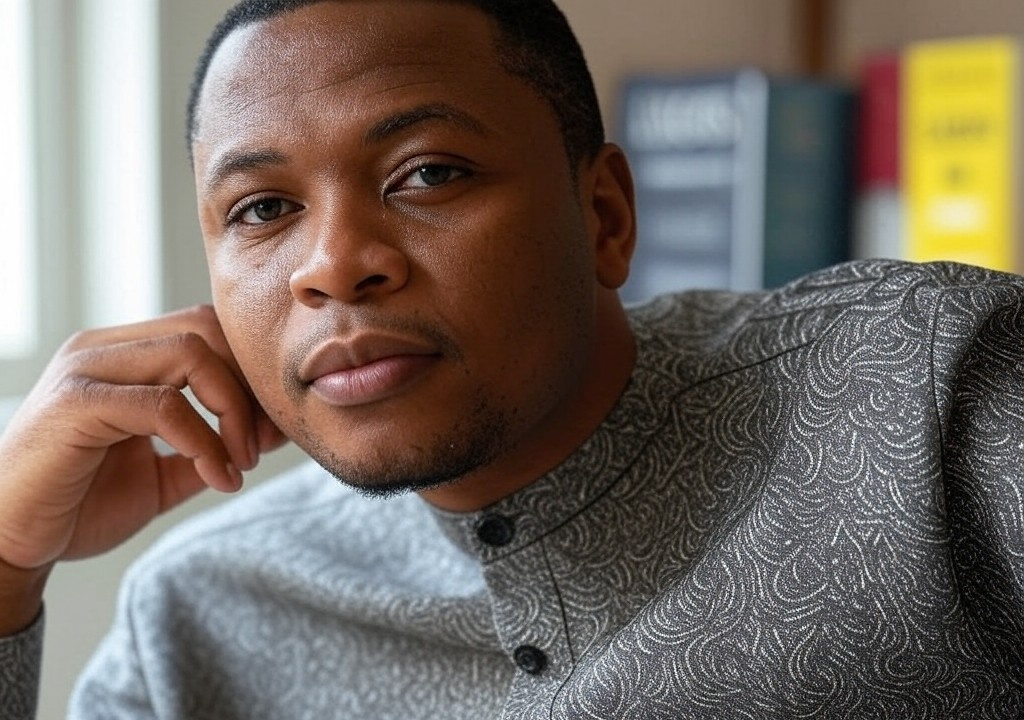What Are You Afraid Of?
Picture this: it’s 2002, and little Malik—a pint-sized immigrant kid with an oversized Eastpak backpack—is standing on stage at his first-ever school talent show in Brooklyn, ready to recite a poem. My palms were drenched, my accent was thick (still carrying echoes of Lagos), and every rational part of my brain screamed, “Run.” But I didn’t. I stayed rooted, recited every line, and landed polite applause. Was it a knockout performance? Probably not. But here’s the twist: That moment shaped my approach to fear, both on stage and—much later—in the scarier, unscripted world of relationships.
Fear has always been my unwanted plus-one in life and love. Whether it was standing on that stage, trying (and failing) to define my identity in Brooklyn, or texting someone “I like you” only to watch them… leave me on read, I’ve learned that fear doesn’t disappear. It doesn’t shrink or politely excuse itself. But I’ve also learned that moving toward fear instead of away from it comes with a payoff—one that keeps you growing.
Let’s talk about that uncomfortable truth and how I’ve wrestled with it, both in and out of romantic relationships.
Fear Isn’t Subtle. But Neither Is Growth.
Fear often shows up like the over-involved aunty at family gatherings: meddling, loud, and certain you’re doing everything wrong. For me, fear always whispers the same question in love: “What if?”
“What if you’re too much?”
“What if they don’t feel the same?”
“What if you fail… spectacularly?”
This inner monologue is familiar because it existed long before I ever had my first crush. Growing up in a Lagos-to-Brooklyn household meant I was no stranger to expectations. I wanted to excel—to honor the sacrifices my parents made by leaving home, to live up to my dad’s steady determination as he launched a small business, and to match my mom’s grit working late hospital shifts. With that pressure came the paralyzing fear of failure. Every risk felt like a potential catastrophe.
Relationships magnified that fear, especially in my twenties, when missteps felt amplified. Like the time I stayed quiet about how I felt with someone I really liked, only to watch them start dating someone else—cue me lying in bed, replaying every missed opportunity over Burna Boy soundtracks. But here’s the thing: Making “safe” choices doesn’t protect you from regret. Choosing comfort over risk won’t guarantee a smooth ride. Growth, as I’ve learned, only comes from stepping into the unknown.
Keep Moving Toward The Thing That Terrifies You
My sister once gave me the best dating advice (though she’s never followed her own): “Whatever feels too scary to say—that’s exactly what you need to say aloud.” At 16, I practiced it cringingly, blurting out wildly unpolished declarations like, “I think you’re really amazing, even if you don’t think I can pull off this haircut.” Surprisingly, honesty worked… occasionally. (Pro tip: don’t lead with self-deprecation if your barber has you out here fading into oblivion.)
Years later, during a stint in London for grad school, I decided to take my sister's advice, this time with higher stakes. I locked eyes with someone across a café—a slight Nigerian accent in her voice, a shared appreciation for the Fela Kuti record playfully referenced in her laptop background. She was intimidatingly stunning, the kind of person who seemed entirely out of my league. So, naturally, my first instinct was to shut down and imagine all the ways I’d embarrass myself. But something clicked (probably the espresso). I walked over and blurted something about how Fela’s music shaped my childhood.
Fast forward to two dates—and about two near-total breakdowns from my nerves later—we hit it off. It didn’t become a lasting romance, but those moments taught me that fearing rejection is natural. What’s unnatural is giving fear the power to stop you.
Why Fear Shows Up in Relationships (and Why That’s Okay)
Fear in relationships isn’t just born of social awkwardness (though that’s part of the recipe). It’s deeper. It’s vulnerability’s first cousin, and vulnerability is a necessary currency for connection. On some level, love requires you to put the most fragile parts of yourself in someone else’s hands and say, “I trust you not to break this.” That’s an outrageous ask, but it’s also how bonds deepen.
Here’s what helps me keep perspective:
-
Everyone Has Scratches on Their Record.
No one comes into relationships shiny and perfect. If they pretend to, they’re probably hiding a mixtape worthy of emotional chaos. I used to obsess over whether people could see my flaws or shortcomings. But over time, I’ve learned that owning your imperfections makes the whole thing less terrifying. The person who’s worth your time will want the full story—messy edits and all. -
Don’t Fear Loss—Fear Settling Instead.
I once stayed in a long-term relationship longer than I should have because I was terrified of the alternative: starting over. We both knew things weren’t working, but the thought of “wasting” three years made us patch up a sinking ship. Spoiler: the ship still sank. The lesson? Loss is a byproduct of living authentically. Settling, however, comes at the cost of your future self’s happiness. -
Fear Disguises Itself as “Logic.”
“I don’t want to scare them away.”
“This is too soon to bring up.”
“Maybe I’ll wait until next time.”
Sound familiar? Fear loves masquerading as reason, but in my experience, self-censorship rarely serves you. Speak your truth—in measured doses, yes, but don’t let it rot inside you. Healthy communication is like planting a garden: it grows something bigger if you give it sunlight and space.
Fear Isn’t the Villain It Pretends to Be
The most crucial lesson I’ve learned about fear is this: It’s not the enemy. It’s a sign that you’re entering important territory. The same nerves I felt as that kid on stage have reappeared in quieter, more profound moments—confessing love the first time, apologizing well after messing up, or even letting someone know when I was too drained to be fully present for them. Each instance felt exposing, like tearing open a wound. But each instance also built resilience.
Fear never truly disappears—but maybe that’s the point. Its persistence is how we know the stakes matter. If you’re scared, it means you’re showing up for something meaningful.
Conclusion: Say Yes to Fear (But Don’t Let It Drive)
The next time you’re staring down the barrel of vulnerability—whether it’s eyeing someone across the room or opening up to someone who already knows you well—remember this: Fear isn’t something to run from. It’s your reminder to lean in.
Love, like growth, doesn’t happen in your comfort zone. It’s forged in moments where you choose courage over the inner critic whispering “What if?” And hey, it’s okay if you don’t nail it the first (or fifth) time. You’re practicing the art of being human—messy, awkward, and unapologetically yourself.
So, what scares you most right now? And what would happen if you did it anyway? Spoiler: Something beautiful might be waiting on the other side.




















